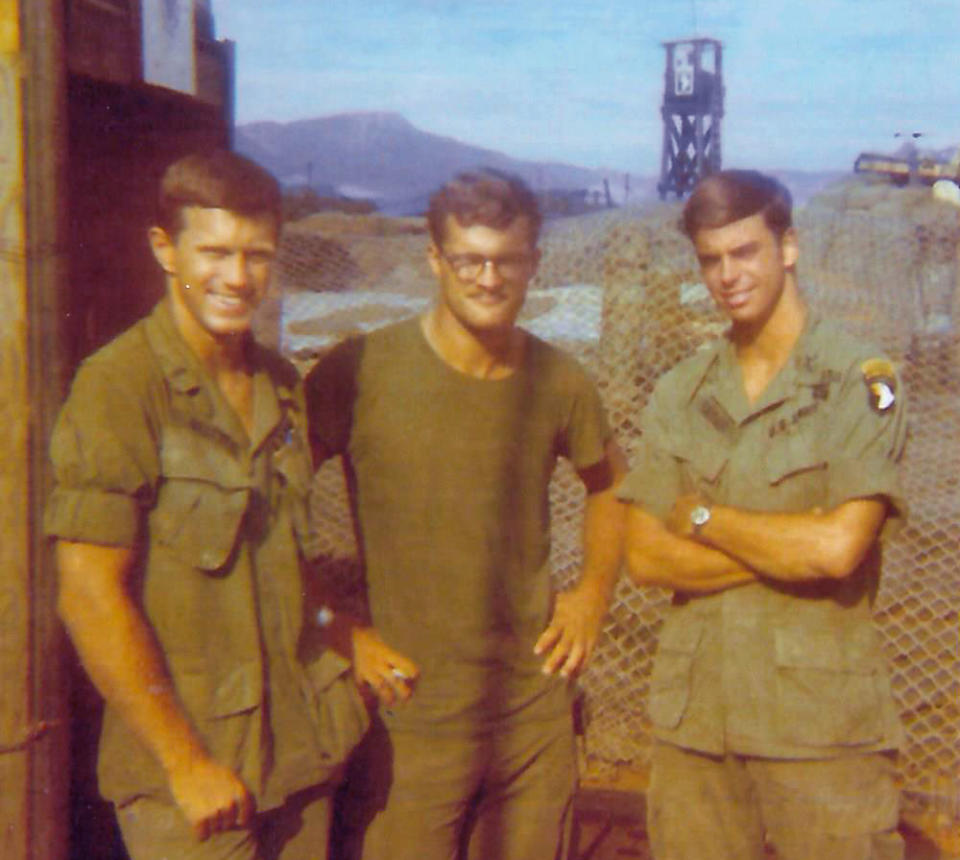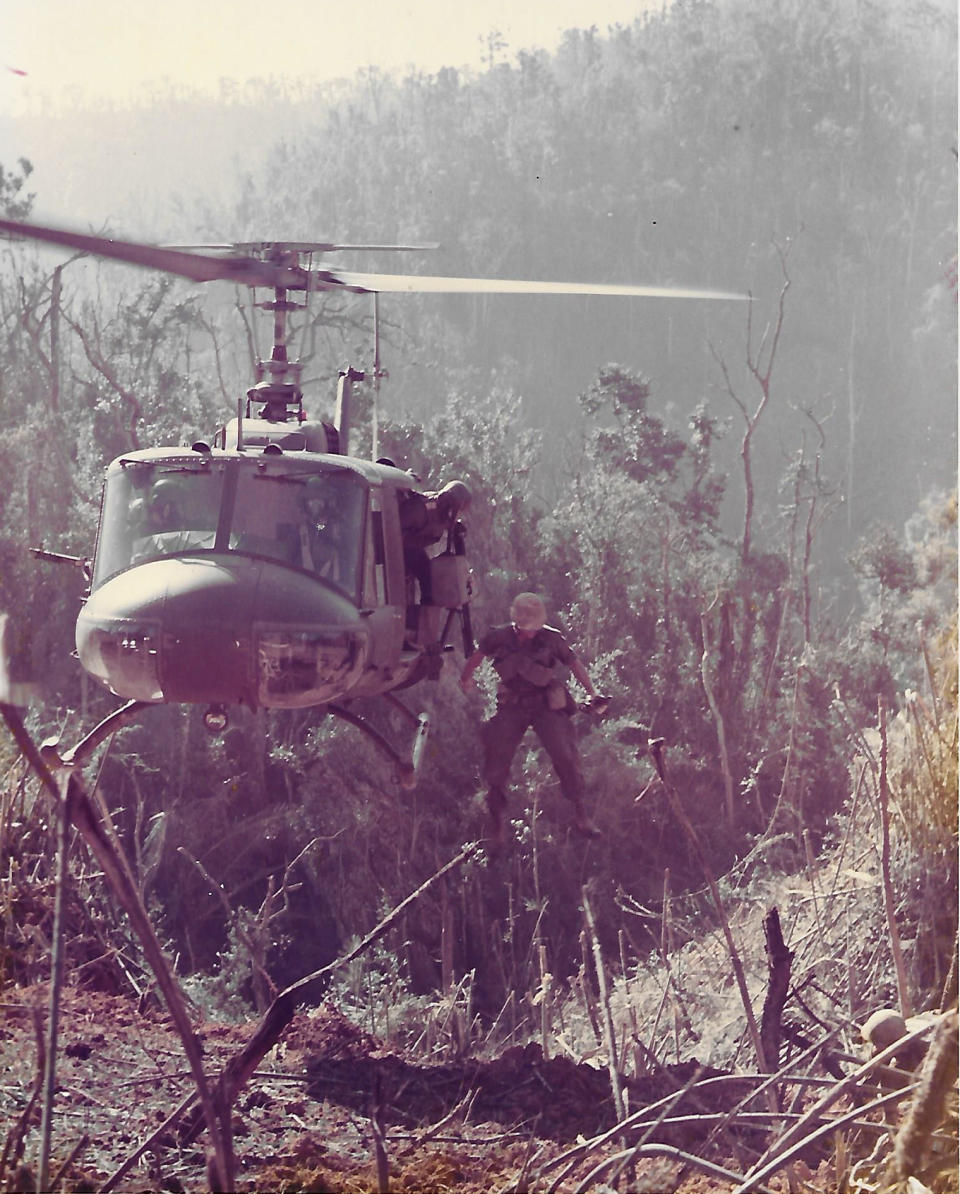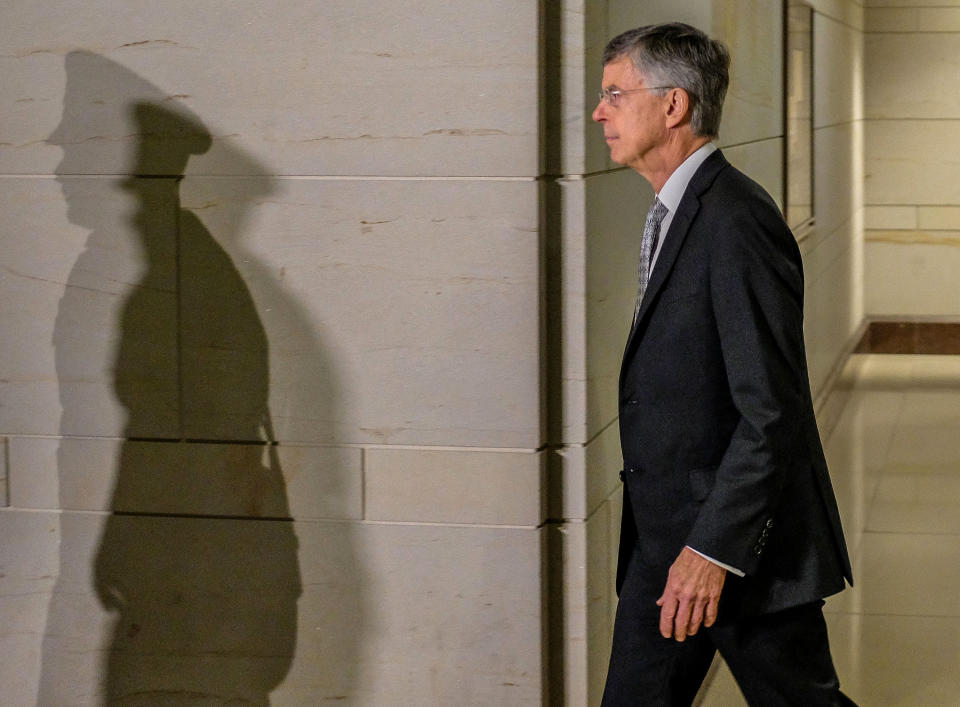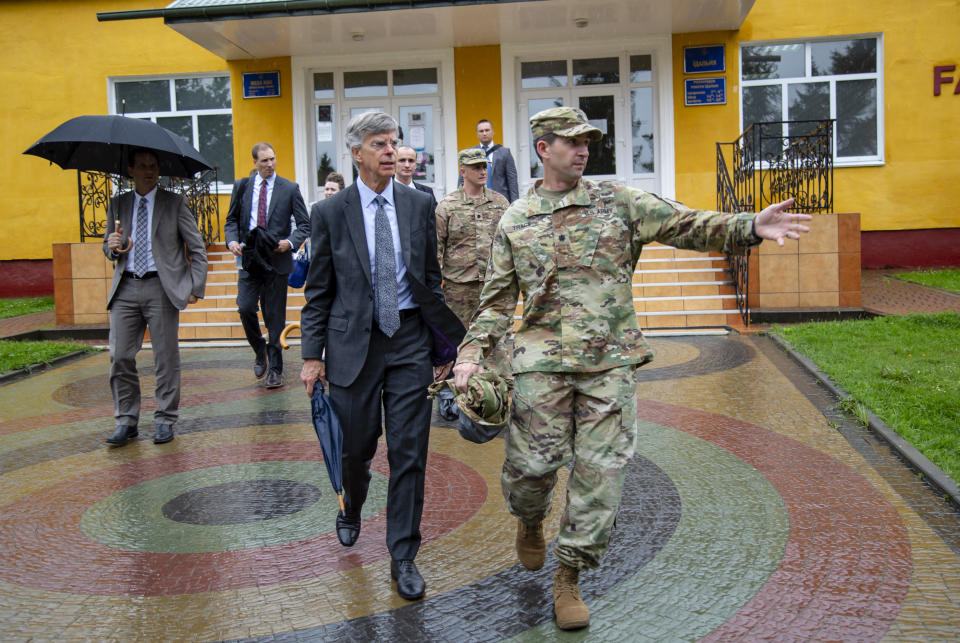For Bill Taylor, first impeachment witness, 'everything's easy after Vietnam'
WASHINGTON — William B. Taylor Jr., was eating dinner in Berlin a few years ago with a group of former American diplomats when the group turned to him and asked him what it was like to fight in the Vietnam War.
“He was the one person at the table who had been there,” Steven Pifer, a former U.S. ambassador to Ukraine who was at the dinner, told Yahoo News.
Taylor described his 18 months as an officer in the Vietnam War, a conflict in which 58,220 American soldiers were killed, as “the most fulfilling job he ever had,” Pifer said.
That grace under pressure helps explain why Democrats are calling Taylor — the 72-year-old acting U.S. ambassador to Ukraine — as their first witness this Wednesday when the House impeachment inquiry of Donald Trump begins public hearings.
Most Americans came to know Taylor on Oct. 3, when Democrats released text messages that showed him calling it “crazy to withhold security assistance [to Ukraine] for help with a political campaign.”
Taylor sent that text to Gordon Sondland, U.S. ambassador to the European Union, on Sept. 9, the same day that House Democrats sent a letter to the White House asking for documents related to the Trump administration’s withholding of assistance funding to Ukraine. The letter mentioned a potential “abuse of power” and “betrayal of the public trust.”

Two days later, the Trump administration released its hold on nearly $400 million in military aid to help Ukraine fend off Russian aggression.
Now Taylor is a key witness for Democrats who hope to convince the nation that Trump should be removed from office. He will go first in part because he kept a documentary record of key conversations due to what one Democratic aide described to NBC News as his “exquisite note-taking.” He will testify, as he did in his deposition, that Sondland told him Trump would not release the funds unless the Ukrainians announced an investigation into Hunter Biden in order “to cast [former] Vice President [Joe] Biden in a bad light.”
“I said on September 9th … [it was] crazy. I believed that then, and I still believe that,” Taylor told House investigators during his impeachment inquiry deposition.
But it’s not just facts that are important for making a case to the American public. Taylor’s life and career are themselves compelling.
He was raised in the northern Virginia suburbs outside Washington, D.C., the son of a U.S. Army engineer whose rise through the ranks of the Army Corps of Engineers was stalled in his late 20s by a near-fatal fight with polio. William B. Taylor Sr. overcame his disease and went on to a distinguished career at NASA working on the moon-landing project, part of the Cold War race against the Soviets.
Like his father, Taylor attended West Point, the academy for training Army officers. He arrived in the fall of 1965, as U.S. involvement in the Vietnam War was escalating. Even so, during his first few months at the academy, the conflict in southeast Asia was largely a distant concern.
But then, in 1966, U.S. casualties in Vietnam began to skyrocket, and many of them were West Point graduates who, just a few months earlier, had been Taylor’s upperclassmen.
“Every week at least there was an announcement in the mess hall at the evening meal of a West Point graduate who had fallen in Vietnam,” retired Col. Bob Seitz, who was in Taylor’s class at West Point, told Yahoo News. “This kept rolling and rolling forward. The first year we didn’t know anybody but the second and third year it became very traumatic.”

Nevertheless, Taylor — and Seitz — both went through Army Ranger school and then were shipped off to lead rifle platoons in the war, which was still raging. U.S. casualties had peaked in 1968, but in 1970 — the year Taylor arrived as a first lieutenant — there were still more than 6,000 U.S. soldiers killed that year.
Taylor served in the 101st Airborne’s 2nd Battalion, 506th Infantry, and for a year commanded 20 to 30 men in his rifle platoon on the front lines of the conflict, in the Quang Tri and Thua Tien provinces of what was then South Vietnam.
“We moved on foot through this very mountainous and jungle-covered area carrying our weapons, our ammunition and very heavy loads in our rucksacks, for weeks at a time. We slept on the ground every night, and were very seldom ever brought back to rear-base areas,” Seitz said. “You just had to endure it and take it day by day.”
Many of their operations involved flying into enemy territory on Huey helicopters and jumping several feet to the ground under enemy fire. And their units were part of Operation Lam Son 719, providing support to South Vietnamese army units as they conducted an offensive into Laos.
“It was a very violent operation,” Seitz said. “It went on for two months. It was a fight every day.”

After a year, Taylor was eligible to return home to the U.S. Instead, he signed up to stay another six months, was promoted to captain, and became commander of Alpha Company.
“For those of us who were there, we still hear the echoes, we still see the shadows in our dreams and we grieve about the losses as if they were not that long ago,” Seitz said. “Everything’s easy after Vietnam.”
Taylor was awarded the Bronze Star Medal and the Air Medal. He left the military in 1975 and went on to work in senior positions at the newly created Department of Energy and then on the staff of Sen. Bill Bradley, D-N.J.
In the 1990s, Taylor oversaw U.S. assistance to Eastern Europe and the former Soviet Union in the years immediately following the fall of the Iron Curtain. During the administration of Republican President George W. Bush, Taylor spent a few years working in Afghanistan, Iraq and on the Middle East peace process. In 2006, he returned to Eastern Europe as U.S. ambassador to Ukraine.
“He has done the hardest jobs in the hardest places with quiet dedication,” William J. Burns, the former deputy secretary of state under Obama and ambassador to Russia under Bush, told Yahoo News
“He has never had an ounce of pretension or ego about him, and served Republicans and Democrats with equal patriotism and drive,” Burns said. “Bill is exactly the kind of person you’d want beside you in a diplomatic foxhole, just as he was all those years ago as a soldier in the foxholes of Vietnam.”
White House chief of staff Mick Mulvaney, however, described the men and women testifying in impeaching depositions as “a group of mostly career bureaucrats who are saying, ‘You know what? I don’t like President Trump’s politics, so I’m going to participate in this witch hunt that they’re undertaking on the Hill.’”

The day after Taylor’s Oct. 22 closed-door deposition, news coverage of his testimony got Trump’s attention. In one tweet, the president called Taylor a “Never Trumper.” This followed a tweet an hour earlier in which Trump had referred to “Never Trumper Republicans” as “human scum.”
Trump’s Republican and Democratic predecessors certainly didn’t see Taylor in a negative light.
In 2011, President Barack Obama sent Taylor back to the Middle East to oversee assistance to Egypt, Libya, Syria and Tunisia. And in 2014, Taylor became executive director of the U.S. Institute of Peace, a government-funded institution that provides support to the State Department.
It was this job at the institute that took Taylor to Berlin, along with Pifer and other American former diplomats, to meet with Russian and Ukrainian officials in unofficial talks aimed at reducing tensions in that part of the world.
At that dinner in Berlin, Taylor described teaching his soldiers to play bridge, and said that of all the experiences in his career, it was his ability to take care of the men under his command in Vietnam that he cherished the most.

Taylor was asked by Secretary of State Mike Pompeo to return to Ukraine this past spring, and described his hesitations in his deposition.
“My wife, in no uncertain terms, strongly opposed the idea,” Taylor said.
In a series of texts in late May with Kurt Volker, special envoy to Ukraine, Taylor said he was “struggling with the decision whether to go.”
“Can anyone hope to succeed with the Giuliani-Biden issue swirling for the next 18 months?” Taylor asked. He knew even then, from press reports quoting Trump’s personal lawyer Rudy Giuliani, that the former New York City mayor was pressuring the Ukrainians to investigate Biden, a leading Democratic rival to Trump for the presidency.
“Do I want to enter this non-normal world?” Taylor asked Volker, and himself, in a May 28 text.
But in his deposition, Taylor recalled the advice that a friend and mentor had given him about the decision.
“The mentor counseled: If your country asks you to do something, you do it if you can be effective,’” he said.
Cover thumbnail photo: Bill Taylor in 2019 and in Vietnam in 1971. (Photos: Alex Wong/Getty Images; courtesy of Bob Seitz)
_____
Download the Yahoo News app to customize your experience.
Read more from Yahoo News:
Rebuilding Paradise: A year after the Camp Fire, one couple finds healing in starting over
'We could be blind': Syria pullout may result in loss of intelligence from the Kurds
Republicans think Trump needs a 'quarterback' as impeachment proceedings go public
PHOTOS: For Syrian Kurds, and aid workers – the ‘safe zone’ is not so safe



